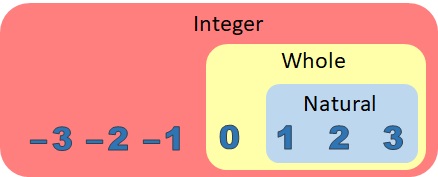Types of Whole Numbers
(KS2, Year 4)
Types of Whole Numbers
Different names are given to different types of whole number.Natural Numbers
A natural number is a whole number from 1 upwards: Natural numbers are sometimes called counting numbers. They are the numbers you would use to count objects.
Natural numbers are sometimes called counting numbers. They are the numbers you would use to count objects.
Whole Numbers
While whole numbers are any number without fractions, we (confusingly) also call the whole numbers from 0 upwards whole numbers:

Integers
An integer is a whole number. An integer may be positive, negative, or zero:
The Difference Between Natural Numbers, Whole Numbers and Integers
Clearly there is a lot of overlap between these three sets of numbers.
Start with the natural numbers...
 ...then add 0 to get the whole numbers...
...then add 0 to get the whole numbers...
 Finally, take the negatives of all the natural numbers, and place them in reverse order, to the left of 0 to get the integers...
Finally, take the negatives of all the natural numbers, and place them in reverse order, to the left of 0 to get the integers...

Positive and Non-Negative Integers
Unfortunately, some people use terms like natural numbers, counting numbers and whole numbers to refer to different sets of numbers than we have defined them here.
Because of this, there are more specific terms to use:
-
The natural numbers {1, 2, 3...} are positive integers
(because they only use the positive integers).
-
The whole numbers {0, 1, 2, 3...} are non-negative integers
(because they include all integers apart from the negative integers {−1, −2, −3...}).
Note: The non-positive integerswill be {0, −1, −2, −3...}.
Integers
An integer is a whole number. An integer may be positive, negative, or zero:
The Difference Between Natural Numbers, Whole Numbers and Integers
Clearly there is a lot of overlap between these three sets of numbers.
Start with the natural numbers...
 ...then add 0 to get the whole numbers...
...then add 0 to get the whole numbers...
 Finally, take the negatives of all the natural numbers, and place them in reverse order, to the left of 0 to get the integers...
Finally, take the negatives of all the natural numbers, and place them in reverse order, to the left of 0 to get the integers...

Positive and Non-Negative Integers
Unfortunately, some people use terms like natural numbers, counting numbers and whole numbers to refer to different sets of numbers than we have defined them here.
Because of this, there are more specific terms to use:
-
The natural numbers {1, 2, 3...} are positive integers
(because they only use the positive integers).
-
The whole numbers {0, 1, 2, 3...} are non-negative integers
(because they include all integers apart from the negative integers {−1, −2, −3...}).
Note: The non-positive integerswill be {0, −1, −2, −3...}.
Worksheet
This test is printable and sendable






